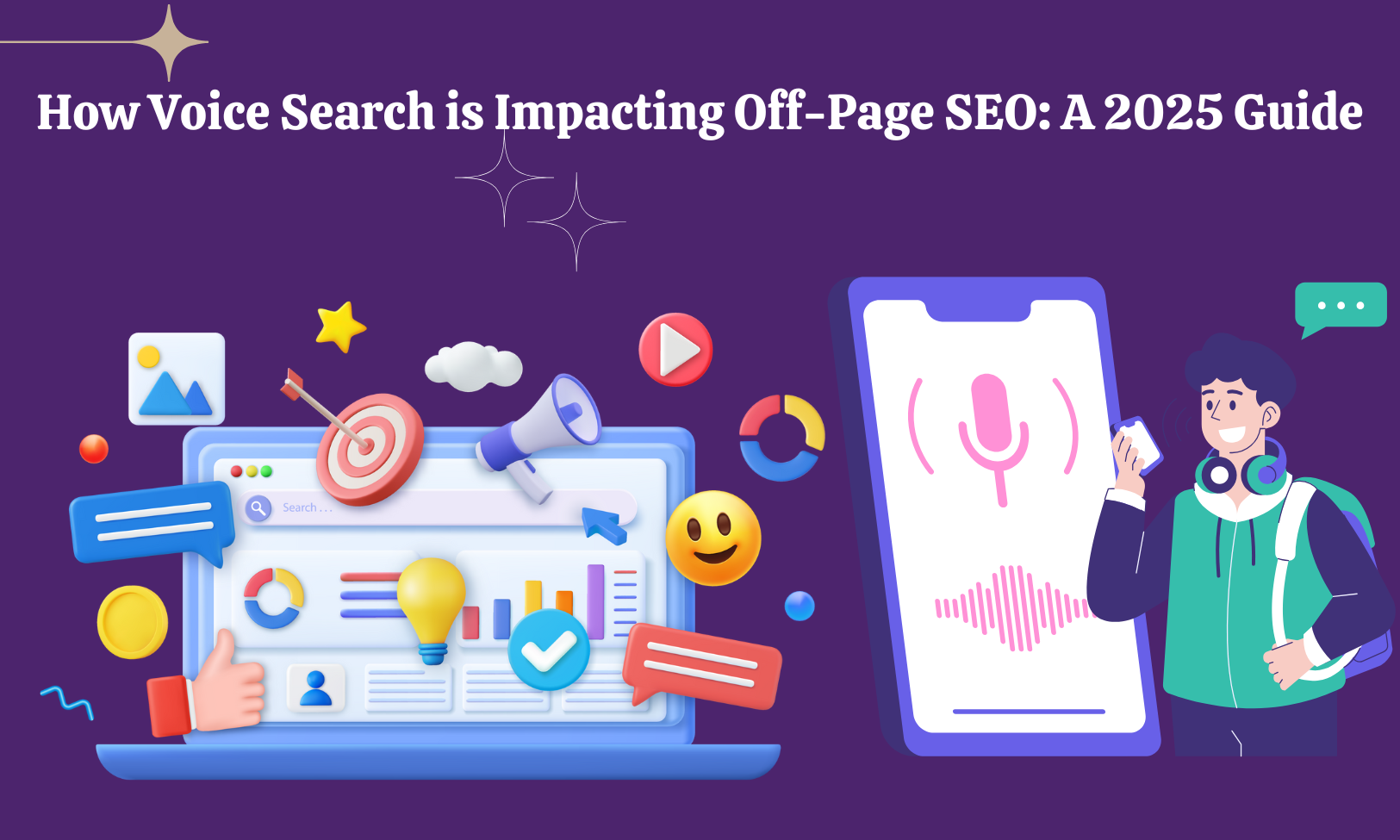How Voice Search is Impacting Off-Page SEO: A 2025 Guide
Voice search is no longer a futuristic concept—it’s here, and it’s changing the way people interact with search engines. With the rise of smart speakers, virtual assistants, and voice-activated devices, voice search is becoming an integral part of our daily lives. For marketers and SEO professionals, this shift presents both challenges and opportunities, especially when it comes to off-page SEO.
Off-page SEO, which focuses on activities outside your website to improve search rankings, is being significantly impacted by voice search. From building backlinks to optimizing for local SEO, voice search is reshaping traditional off-page SEO strategies. In this guide, we’ll explore how voice search is impacting off-page SEO and what you can do to stay ahead in 202
Why Voice Search Matters
Voice search is growing rapidly, with over 50% of all searches expected to be voice-based by 2025. This trend is driven by the convenience and speed of voice-activated devices like Amazon Echo, Google Home, and smartphones.
For SEO, voice search introduces new dynamics:
- Conversational Queries: Voice searches are often longer and more conversational than text-based searches.
- Local Focus: Many voice searches are location-based, such as “near me” queries.
- Featured Snippets: Voice assistants often pull answers from featured snippets, making them a key target for optimization.
As voice search continues to grow, it’s essential to adapt your off-page SEO strategies to stay competitive.
How Voice Search is Impacting Off-Page SEO
Off-page SEO involves activities like building backlinks, earning social signals, and increasing brand mentions. Here’s how voice search is influencing these strategies:
1. Changing Keyword Strategies
Voice search queries are typically longer and more conversational than text-based searches. This shift requires a new approach to keyword targeting.
Impact on Off-Page SEO:
- Focus on Long-Tail Keywords: Optimize for natural, conversational phrases that match voice search queries.
- Answer Questions: Create content that answers common questions in a conversational tone.
Example:
Instead of targeting “best restaurants,” optimize for “What are the best Italian restaurants near me?”
2. Emphasizing Local SEO
Voice search is heavily influenced by local intent, with many queries including phrases like “near me” or “close by.”
Impact on Off-Page SEO:
- Build Local Citations: Ensure your business is listed on local directories like Google My Business, Yelp, and TripAdvisor.
- Earn Local Backlinks: Partner with local businesses, blogs, and influencers to build niche-relevant backlinks.
- Encourage Reviews: Positive reviews on platforms like Google and Yelp can improve your local SEO and voice search rankings.
3. Leveraging Featured Snippets
Voice assistants often pull answers from featured snippets, making them a critical target for optimization.
Impact on Off-Page SEO:
- Create Snippet-Worthy Content: Structure your content to answer specific questions concisely.
- Earn Backlinks to Snippet Content: High-quality backlinks to your snippet-optimized content can improve its visibility.
- Promote Snippet Content: Share your snippet-optimized content on social media and other platforms to increase its reach.
4. Enhancing Brand Authority
Voice search devices often prioritize authoritative and trustworthy sources. Building your brand’s authority is crucial for ranking in voice search results.
Impact on Off-Page SEO:
- Earn High-Quality Backlinks: Focus on building backlinks from authoritative websites in your niche.
- Increase Brand Mentions: Encourage mentions of your brand on reputable websites and blogs.
- Leverage Social Signals: A strong social media presence can enhance your brand’s authority and visibility.
5. Optimizing for Mobile and Speed
Voice searches are often conducted on mobile devices, making mobile optimization and page speed critical factors.
Impact on Off-Page SEO:
- Build Mobile-Friendly Backlinks: Ensure the websites linking to you are mobile-friendly.
- Promote Fast-Loading Content: Share content that loads quickly on mobile devices to improve user experience.
- Leverage AMP: Use Accelerated Mobile Pages (AMP) to improve your site’s mobile performance.
6. Using Structured Data and Schema Markup
Structured data helps search engines understand your content better, making it easier for voice assistants to pull relevant information.
Impact on Off-Page SEO:
- Add Schema Markup: Use schema markup to highlight key information like FAQs, reviews, and local business details.
- Earn Backlinks to Structured Content: High-quality backlinks to your structured content can improve its visibility in voice search results.
Strategies to Optimize Off-Page SEO for Voice Search
To stay ahead in the voice search era, here are some actionable strategies to optimize your off-page SEO:
1. Create Conversational, FAQ-Style Content
- Write content that answers common questions in a conversational tone.
- Use headings like “What,” “How,” and “Why” to structure your content.
Example:
“How to Plan a Budget-Friendly Trip to Bali”
2. Build Local Backlinks
- Partner with local businesses, bloggers, and influencers to earn niche-relevant backlinks.
- List your business on local directories and encourage reviews.
3. Leverage Social Media
- Share your content on social media platforms to increase its reach and engagement.
- Encourage your audience to share your content and leave reviews.
4. Focus on Brand Building
- Create a strong brand presence through content marketing, PR, and influencer collaborations.
- Encourage brand mentions by providing value and building relationships.
5. Optimize for Featured Snippets
- Use tools like SEMrush or Ahrefs to identify snippet opportunities.
- Structure your content to provide clear, concise answers to common questions.
6. Monitor and Adapt
- Use tools like Google Analytics and Google Search Console to track your voice search performance.
- Stay updated on voice search trends and adjust your strategies accordingly.
Tools to Optimize Off-Page SEO for Voice Search
Here are some tools to help you optimize your off-page SEO for voice search:
1. Google My Business
- Optimize your local listings to improve visibility in local voice searches.
2. AnswerThePublic
- Identify common voice search queries and create content around them.
3. SEMrush
- Analyze your competitors’ voice search strategies and identify opportunities.
4. Moz Local
- Manage your local citations and improve your local SEO.
5. Schema Markup Generator
- Add structured data to your website to enhance voice search visibility.
Voice search is transforming the way people search for information, and its impact on off-page SEO cannot be ignored. By adapting your strategies to focus on conversational keywords, local SEO, featured snippets, and brand authority, you can stay ahead of the curve and boost your search rankings in 2025.
As voice search continues to grow, staying updated on the latest trends and tools will be essential for long-term success. Start optimizing your off-page SEO for voice search today, and watch your website climb the rankings.




